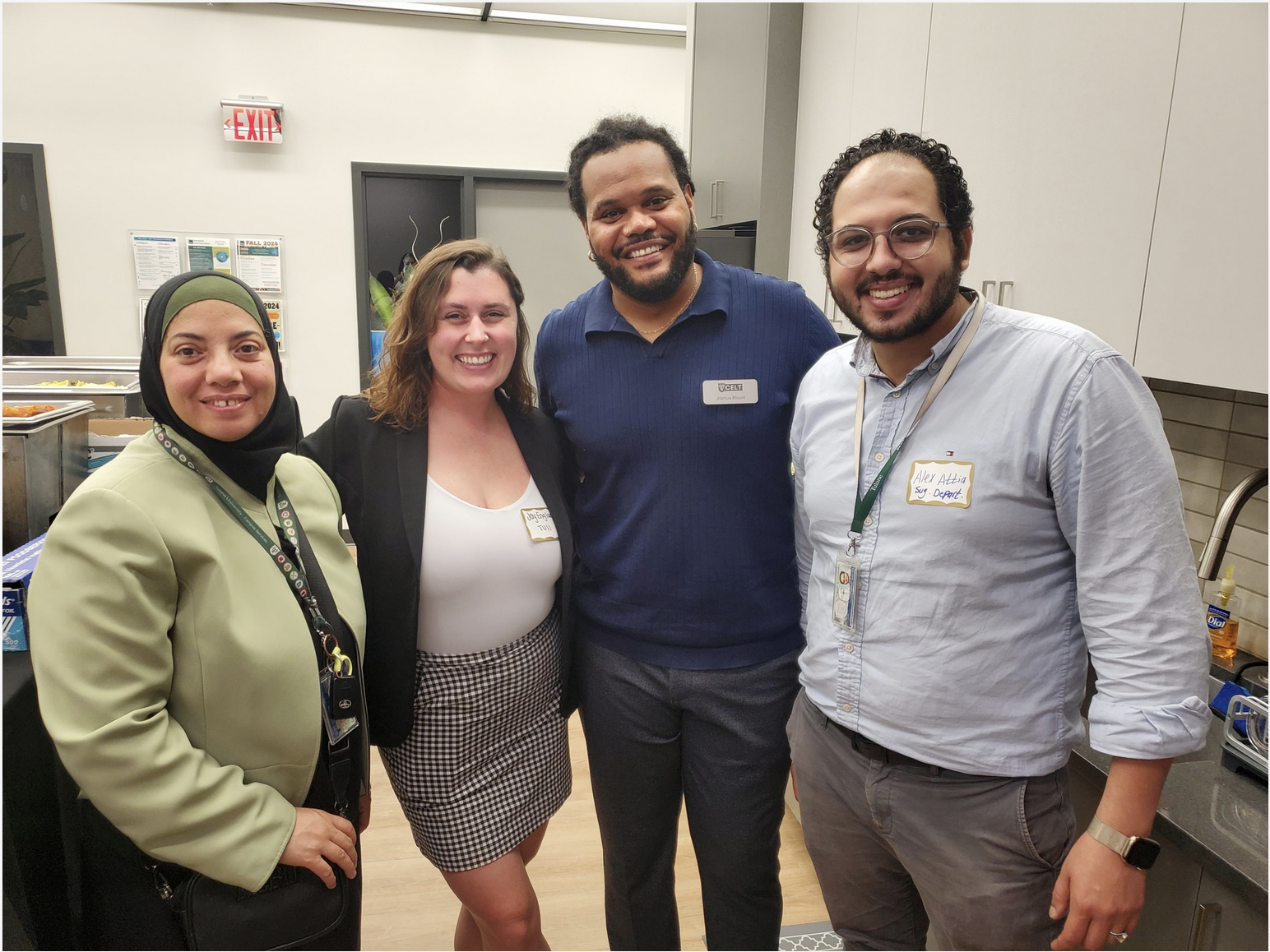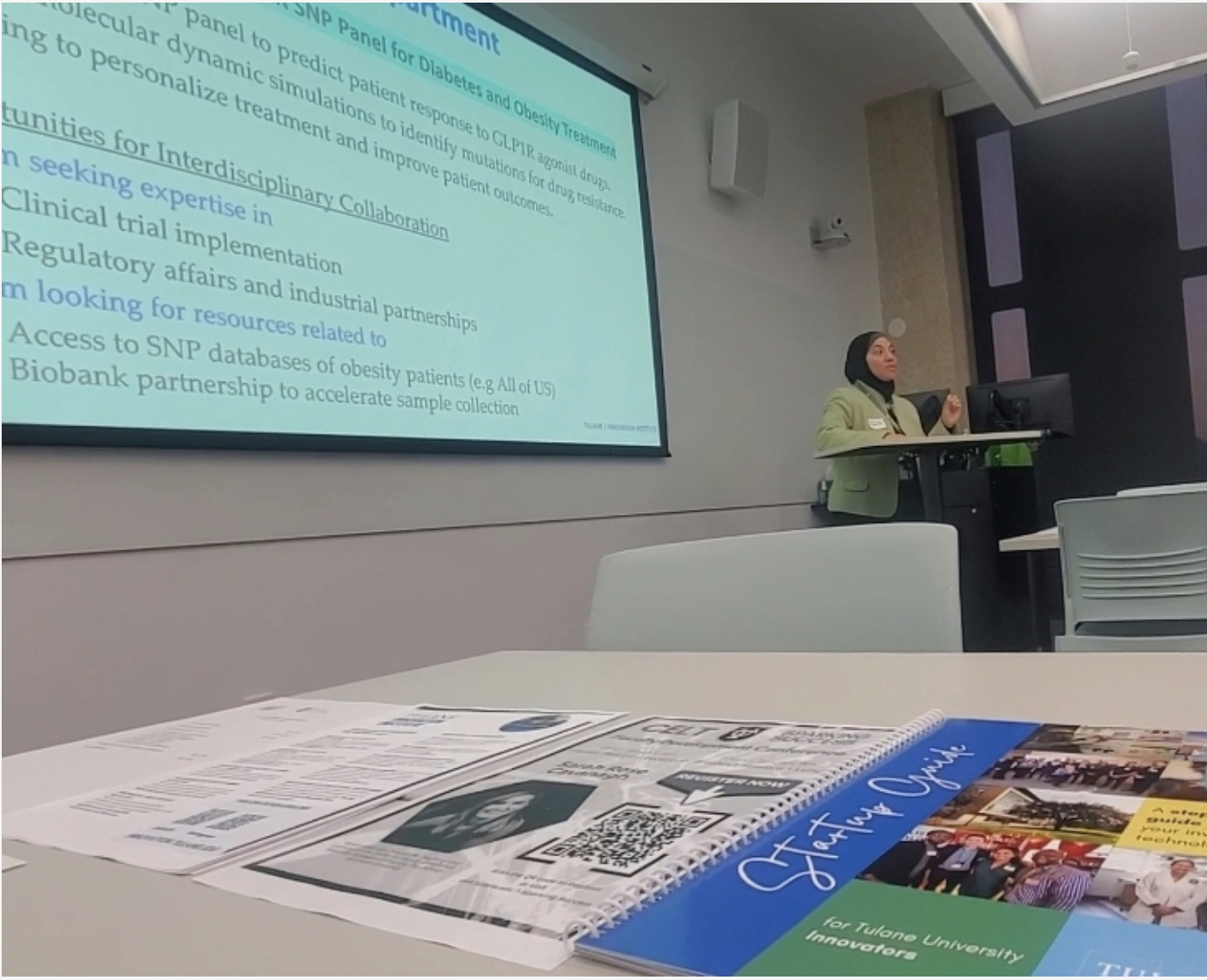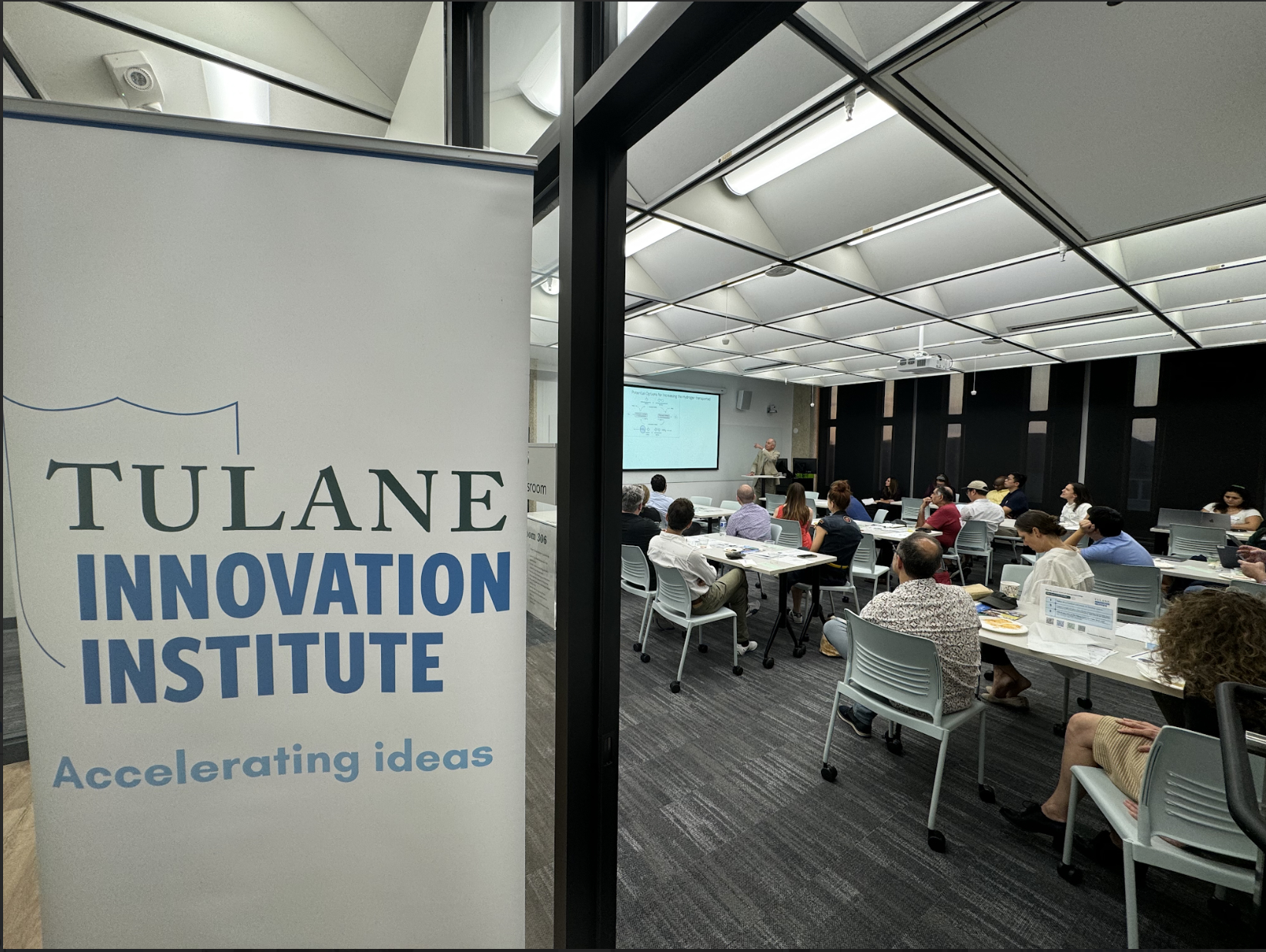Tulane Innovation Institute Faculty Innovation Mixer promotes Interdisciplinary Research Collaboration

Pictured from left to right Dr. Eman Toraih (School of Medicine), Jay England (Tulane Innovation Institute), Joshua Blount (CELT), and Dr. Alex Attia (School of Medicine).
October 15, 2024
On October 15, 2024, the Tulane Innovation Institute and Tulane Center for Engaged Learning and Teaching (CELT), hosted a Faculty Innovation Mixer at the Howard Tilton Memorial Library. The event brought together faculty from across Tulane’s schools— School of Medicine (SOM), Science and Engineering (SSE), and Freeman School of Business (SOB)— to create interdisciplinary connections and share new research ideas. Faculty members pitched their niche research areas to their colleagues to explore collaboration opportunities in diverse fields of study
The evening started with professional networking and refreshments, and then selected faculty showcased their research and identified potential collaborative needs. Seven faculty members gave the audience insights into their current work and the desired partnerships that could advance their ideas.
Dr. Alex Attia from the School of Medicine, specializing in Research Surgery, Machine Learning and AI Integration, presented his work on TU4EI-Vision, a multi-modal AI tool designed to enhance diagnostic accuracy for trauma and cancer lesions in various body regions. Dr. Attia highlighted opportunities for collaboration in computer vision and software library integration and resources related to CT/MRI scans to further his research.
Dr. Brian Deskin from the School of Medicine discussed his focus on the cellular interactions involved in idiopathic pulmonary fibrosis (IPF). His long-term goal is to develop mechanism-based, clinically relevant therapeutics for IPF. His project involves creating a genetic medicine platform for lipid nanoparticle delivery to lung fibrotic lesions. He is seeking expertise in lipid nanoparticle chemistry and aerosol biology, along with resources related to biotech startups and funding in New Orleans.
Dr. Lu Peng from the Computer Science department showcased his work on a hardware-accelerated blockchain transaction processing unit, which demonstrated speeds up to 250 times faster than an Intel i7 CPU, with added heightened security. He seeks expertise in Blockchain applications, including decentralized finance (DeFi), supply chain management, healthcare and medical records, energy trading, and grid management. Dr. Peng also seeks resources to commercialize his work through investment opportunities.
Professor Eric Smith from the Tulane Energy Institute (SOB) presented Liquid Organic Hydrogen Carriers (LOHCs) as a promising method for transporting hydrogen. LOHCs, specifically aromatic compounds like BTX, offer low hydrogen yield and stability, avoiding the high temperatures required by ammonia. His research uses compounds like Dibenzyl Toluene for long-distance hydrogen transport due to its efficient hydrogen-carrying capacity. Professor Smith highlighted opportunities for collaboration in optimizing LOHCs for transport applications.
Dr. Harish Sujan from the Marketing-Business department addressed the issue of negative stereotyping in consumer research, especially concerning salespeople perceived through superficial cues. His research explores how these biases can be corrected when consumers receive helpful information and recommendations, countering initial negative impressions. Dr. Sujan seeks collaboration with experts in social media, generative AI, and those who study human reappraisal processes to help develop strategies that enable people to rethink their judgments and reduce bias in initial impressions.

Dr. Eman Toraih (pictured above) from the Surgery Department discussed her work in precision medicine, specifically developing a GLP1R SNP panel to predict patient responses to diabetes and obesity treatments. Her research uses molecular dynamic simulations to identify mutations that lead to drug resistance, aiming to personalize treatment and improve patient outcomes. Dr. Toraih is seeking collaboration in clinical trial implementation, regulatory affairs, and industrial partnerships, as well as resources such as SNP databases of obesity patients and biobank partnerships for sample collection.
Dr. Yanxu Zhang from the Earth and Environmental Sciences department focuses on the biogeochemical cycling of legacy and emerging contaminants, including mercury, plastics, antibiotics, PFAS, and radionuclides. His work involves using Earth system models to trace these contaminants’ sources, transport, and potential impacts on human health. Dr. Zhang is interested in interdisciplinary collaboration in health sciences (epidemiology, public health), chemical engineering (green chemistry, pollution prevention), and AI/ML to develop efficient models for understanding contaminant cycles.
After the presentations, attendees transitioned into the “Speed Connections” segment—a fast-paced, team-building activity designed to ignite additional cross-disciplinary ideas. Faculty formed teams and worked through five rounds, brainstorming new research concepts and innovative teaching approaches. With prizes on the line, faculty members pitched their collaborative ideas to the group in a fast-paced competition.
The Faculty Innovation Mixer program exemplifies the Tulane Innovation Institute’s commitment to supporting Tulane faculty research ambitions. By encouraging cross-departmental partnerships, the Institute encourages faculty to push boundaries and innovate in ways that have a lasting impact on academia and beyond.
For more information about Faculty programs and opportunities hosted by the Tulane Innovation Institute, visit innovation.tulane.edu/programs.
Story written by Carter Williams, Marketing and Management Major, A.B Freeman School of Business Tulane University

